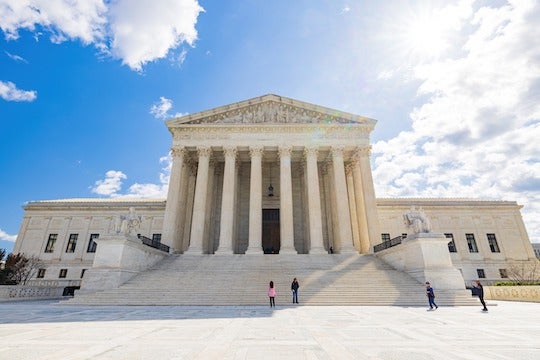In the wake of recent U.S. Supreme Court rulings on student loan debt relief, LGBTQ+ protections and business owner rights, Rice University experts are available for comment.
Three Rice economists can discuss today’s decision to strike down student loan relief.
John Diamond is the director of the Baker Institute for Public Policy’s Center for Public Finance, the Edward A. and Hermena Hancock Kelly Fellow in Public Finance and an adjunct professor of economics.
Zach Bethune, an associate professor of economics in Rice’s School of Social Sciences, specializes in macroeconomics and finance.
James DeNicco is a senior lecturer and director of the Principles of Economics Program in Rice’s School of Social Sciences.
When interviewed prior to today’s decision, they offered the following statements:
“Allowing the Biden student loan debt forgiveness program to go forward would increase the debt by $600 billion dollars, increase inflation and benefit the top 60 percent of the income distribution much more than the bottom 30 percent,” Diamond said. “It's a poorly targeted and conceived policy.”
“There are $1.6 trillion student loans outstanding, over half owed by borrowers under the age of 40,” Bethune said. “The Federal Reserve Bank of New York estimated the White House’s plan would cancel $441 billion in federal student loans – about 31% of the total outstanding federal student loan balance and 28% of all student loans. Given the plan’s income caps, student debt cancellation would disproportionately benefit lower- to middle-income households with student loans.”
However, Bethune noted that student loan borrowers are much less likely to be lower income in the first place, so the plan overall would predominantly affect middle to middle-high income/wealth households. In terms of macroeconomic consequences, he said a negative ruling by the court would put a damper on household spending, as higher levels of debt tend to reduce aggregate demand. On the other hand, he said a positive ruling would likely increase demand as well as inflationary pressures in the short run.
“The $441 billion relief package is approximately 36% of the current federal deficit, so the plan would represent a large, unbacked fiscal transfer,” Bethune said. “This would have immediate effects on the market’s anticipation of future interest rate increases by the Fed given new inflationary pressures.”
DeNicco said upholding the loan forgiveness raises questions of fairness.
“There are going to be tens of millions of people who either saved for college, took out loans and already repaid them or decided to forgo college altogether because of the costs,” DeNicco said. “These individuals will now have to help foot the bill for others who made the conscious choice to take out student loans to earn a college degree and who in many cases are going to have higher earning potential throughout their lifetimes.”
DeNicco also noted that moving forward with the plan will exacerbate already unsustainable debts and deficits and potentially create a moral hazard that leads to higher education costs and more cumbersome student loan debt in the future.
“How will this change peoples’ behavior going forward? Are people now going to be more willing to take on cumbersome debt in the future to go to college thinking they will eventually receive government loan forgiveness?” DeNicco said. “Will universities try to take advantage of this by raising tuition and making a college education even more expensive?”
Additionally, two Rice political scientists can discuss the recent decisions.
Paul Brace, the Clarence L. Carter Professor Emeritus in Rice’s Department of Political Science, is an expert on judicial decision making. He can discuss the decisions on student loans, affirmative action, gay rights and more.
Joseph Cozza, a visiting assistant professor in Rice’s Department of Political Sciences , is also an expert on judicial decision making, and focuses on questions of court legitimacy as well as the relationship between the court and public opinion. He can also provide comparative context as to how the court functions based on his studies of high courts around the world.
To schedule an interview with one of these experts, contact Amy McCaig, senior media relations specialist at Rice, at 713-348-6777 or Avery Ruxer Franklin, media relations specialist, at 713-348-6327.

